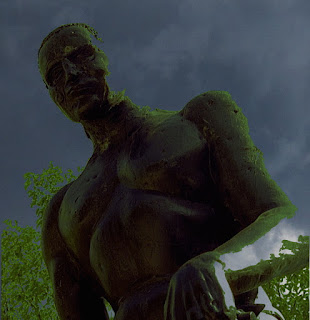Hellboy: Darkness
Calls – Chapter 1
Joyce Carol Oates, a National Book Award winner, observed,
“In the ruins of American empire, what more appropriate figure of
salvation/damnation than Mike Mignola’s Hellboy?”
I fell in love with the Hellboy
comic partly because of Mike Mignola’s subtle, haunting artwork. There were plenty of great stories in the
early books, but the mythological power of the series reached a new level in
the collection Darkness Calls. Duncan Fegredo’s art is more complex and
frenetic than Mignola’s – but it works really well.
Frontispiece image: A Hand Writes in Blood
Italy. In the bucolic wilderness a man has entered a
ruined castle. In a chamber beneath the
earth he invokes a goddess of darkness. Stone
statues watch him, their faces mere echoes of life – unable to do anything now
but contemplate the drama that unfolds before them.
“Hectate,” says Bromhead.
Birds flutter about, even though this is a subterranean space. An iron maiden appears, a device of torture
given spirit-form. Iron as ephemeron. Ghosts
are weighty things in the world of Hellboy. Arcane knowledge reveals the ghost behind the
iron – a zombie-lich woman, rather than a true goddess. The man is smug as he notes her “human
heart.” He has no such thing, perhaps,
but he does have power.
England. A bird delivers broken horns to wrinkled witches – a fragment of Hellboy reshaped into his likeness. Soul and substance bound together, like demon
flesh and human spirit in the character of our protagonist.
A house by the sea. Hellboy doesn’t speak in poetry. He grunts and grumbles. He smokes and drinks and swears. His near-infinite strength is masked by his
slumping, sleepy posture. His
magic-addled destiny is counterbalanced by indifference, weariness, even resentment.
“Aye, aye, Mister Stormalong,” sing some witches, summoning.
Alfred Bulltop Stormalong was a New England folk hero. Reading the entry on Wikipedia, it’s easy to
imagine that this guy was the spark behind the whole notion of Hellboy. Bulltop? A life-long rivalry with a Kraken!? It's interesting that the Wikipedia entry mentions a possible
connection with African-American folk songs, though I see no evidence that Stormalong himself was supposed to be black. Curiously, one version of Stormalong’s death involves a race with a steam
ship – a noteworthy parallel to John Henry’s famous battle with a steam hammer.
Come to think of it, there could be an interesting dialogue
between race and Hellboy. I’m reminded of Ralph Ellison’s fascinating
suggestion: “I propose that we view the whole of American life as a drama acted
out upon the body of a Negro giant, who, lying trussed up like Gulliver, forms
the stage and the scene upon which and within which the action unfolds”
(“Twentieth-Century Fiction and the Black Mask of Humanity” in Shadow and Act). Isn’t that akin to what Mignola’s doing with
Hellboy? ... Portraying a giant body, brutalized but indestructible, which
becomes the stage for all of history and mythology, the nexus point and crisis
point for humanity? Then read Hellboy’s
“Hell” as slavery: a place of chains and punishments, a subterranean space of
which many won’t dare to speak, but which underlies or influences every evil
and every temptation in the world above?
The woods. Shadows from deep history still linger, with
sharp swords and wicked hearts. A witch
hunter. The war on women is old, after
all, strewn with nooses – couched in the discourse of madness, magic,
abnormality. Now one man is a corpse in
the woods, tangled in the trees, waiting.
“I drive away clouds… and break the jaws of snakes with my
words,” says a stranger, a man who might not be a man. Witch corpses burst from the ground, like
withered and tormented flowers spawned from the splash of an arcane brew. The leaves and broken branches swirl like a
vortex at sea. The sea, the woods – it’s
all the same, it’s all mutable and interconnected. Storm along, storm along…
Images (both altered): “Head with Horns,” Paul Gauguin (Getty Open Content), John Henry Statue - https://en.wikipedia.org/wiki/John_Henry_(folklore)#/media/File:John_Henry-27527.jpg


No comments:
Post a Comment